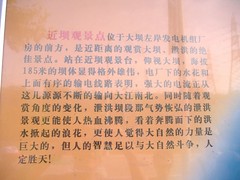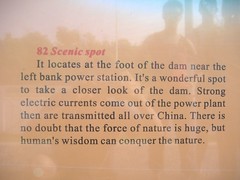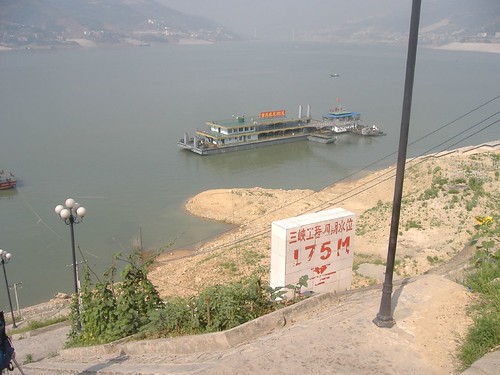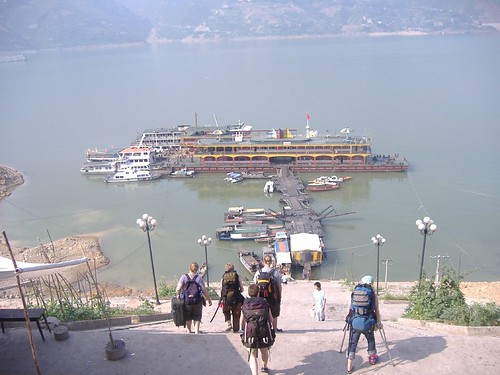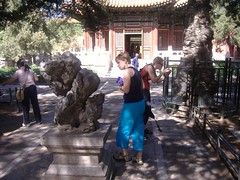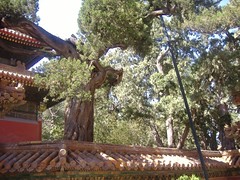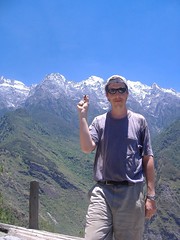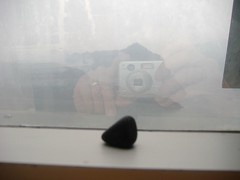Here is the second part of my paper "What a strange little man": Baltar and the Image of the Tyrant, for a volume meant to introduce total novices to philosophy through the show Battlestar Galactica. Part 1 is
here.
“I Don't Have to Listen. I'm the President”: The Weakness of the Tyrant as seen in Plato and Baltar Plato’s most famous description of the life of the tyrant comes in his book
The Republic,(1) a sprawling masterpiece that is meant to answer the question “why be just?” but on the way develops sophisticated theories about the nature of knowledge, art, and existence itself. The crux of Plato’s answer to the question “Why be just” is that the soul of the unjust person is out of balance. His soul is ruled by its crudest desires, and stifles any part of itself that is capable of perceiving what is best in the world. The culmination of this argument is Plato’s description of the tyrannical man, a person whose soul is like a city governed by mad dictator. The picture he paints winds up looking a lot like Gaius Baltar. The interesting thing is that right now Plato is only talking about a man whose soul, internally, is like a tyrannized city. Plato further imagines the disaster that would ensue if a person with a tyrannized soul actually became the tyrant of a city, externalizing the injustice in his breast. The resulting picture approaches Baltar’s presidency.
If you asked an average fan why Baltar is the bad guy, they would probably say because he betrayed his people to genocidal robots (a practice most ethicists frown on.) Plato would have you look at his soul. He begins by asking us to think of the part of ourselves that comes out when we sleep, the part that makes you have dreams of doing things that appall you when you wake up and remember them. This part of us, Plato says, “doesn’t shrink from trying to have sex with a mother, as it supposes, or with anyone else at all, whether man, god or beast. It will commit any foul murder, and there is no food it refuses to eat. In short it omits no act of folly or shamelessness” (571d). When you are asleep, this part of your mind gets its way, with horrifying results. Now imagine someone who lets this part of their mind rule their waking life. (Perhaps you don’t have to imagine too hard.) When you first meet this person, you might think they are a free spirit, because they do what they want when they want, but really they are enslaved, because every other aspect of their self has been subordinated to the task of satisfying whatever desire has bubbled to the surface currently.
When Plato needs to give a name to the part of the soul that rules in the tyrannical man, he calls it lust. This is a strange move. The soul is full of desires that can get us in trouble, desires for money, fame, power, drugs, even food. Like lust, these are not bad in themselves, but are ruinous if you let them run your life. Plato probably picks on lust merely because he is not a fan of the body and its biological functions, and lust is very much a bodily sin, unlike the desire for fame, and makes a better candidate for the ruin of tyrants than the other cardinal sin of the body, gluttony.
Odd though it is, Plato’s choice of lust to be the tyrant of the soul of the tyrannical man fits Baltar to a T. Baltar’s sexual exploits are the root of most of his problems, beginning with selling out the human race to the sultry Cylon Caprica Six. For the rest of the series, he is played like a fiddle by a mysterious image of Six which only he can see. She wears preposterously revealing outfits, leans on his shoulder, whispers in his ear, and gets him to advance the Cylon agenda, chiefly though his candidacy for president. But it is not just the Sixes who keep Baltar under their spell. We know he was sleeping with at least one other woman during his first affair with Caprica Six, because in the opening miniseries we see Caprica catch them together. (Baltar does a spectacularly poor job of talking his way out of it.)
According to Plato, once the soul of the tyrannical man comes to be dominated by lust, all sorts of other vices follow, and low and behold we see these in Baltar as well. Lust is not alone in his soul: it rules over a swarm of other desires, all of which must be sated, at great cost. Thus, the man with the tyrannized soul becomes a liar and a thief to satisfy all these wants. Baltar, to appease his inner Six, lies and says that he needs a nuclear weapon to make a Cylon detection device. Later after he falls under the spell of another Six he has rescued from torture, he has the nuclear weapon smuggled to her, which she promptly uses to destroy a colonial ship, the Cloud Nine, signaling the human’s location to the Cylons. But again, it is not only lust for Six that drives Baltar to lie. He also refuses to reveal that Boomer is a Cylon, out of simple fear of what she will do if he does.
But most importantly, Plato says the man with the tyrannized soul will become a traitor. If he is an ordinary man with no one else to betray, he will betray his parents. “he’d sacrifice his long loved and irreplaceable mother for a recently acquired girlfriend he can do without…for the sake of a replaceable boyfriend in the bloom of youth, he’d strike his aged and irreplaceable father, his oldest friend” (574b). If the man with the tyrannized soul has more power, he will betray his city: “he’ll now chastise his fatherland, if he can, by bringing in new friends and making the fatherland, and his dear old motherland (as the Cretans call it) their slaves” (575d). And, we can add, if he is a scientist in charge of the interplanetary defense mainframe, he will let space robots annihilate his species.
The man with a tyrannized soul is also a coward: “what about fear? Aren’t the tyrannical city and man full of it?” (178a). Baltar lies to Boomer about the results of her Cylon test because he simply can’t face her. More importantly, every lie Baltar tells gives him a new reason for fear. He has a standing fear that Roslin will discover that he has betrayed the human race. As soon as he is president, he has to order Adama to stop the investigation into the destruction of Cloud Nine, because he knows it will lead back to him. Strikingly, Baltar’s cowardice is very much driven by his self centeredness. In the miniseries, when he realizes he has let the Cylons infiltrate the Colonial defense mainframe, his first response is to be afraid for himself: what if people find out I was involved with this? Once it is clear that the whole planet is under attack, his only thought is a trembling “How can I get out of this? How can I save my own personal hide?”
One of the saddest facts about a person with a tyrannized soul is that he never has any friends, only allies or enemies. “If he happens to need anything from other people, isn’t he willing to fawn on them and make every gesture of friendship, as if he were dealing with his own family? But once he gets what he wants, don’t they become strangers again?...someone with a tyrannical nature lives his whole life without being friends with anyone, always master to one man or a slave to another.” Baltar certainly lives this way. The only person he has a relationship with is his internal image of Six, and even she is using him, his master, really. Once president, he takes with a pair of statuesque women, but they never even speak on camera, appearing to the viewer more as concubines than partners. Felix Gaeta works as his assistant, but only because he has to. Baltar clearly has a lonely existence.
Simply put, Baltar is not empowered by his perfidy. We think that life would be easier if we could just lie to people, rather than tell them the ugly truth that they are a murderous robot, but really each lie makes our own lives worse. (Baltar should have followed the wisdom attributed to Mark Twain: “Always tell the truth, that way you don't have to remember anything.”) Baltar isn’t made happy for pursuing his desires, either. He simply spends his energy and is left wanting more. Thus Plato says “The tyrant soul also must of necessity always be poor and unsatisfiable” (578a).
But there are worse things that can happen to a man than for him simply to act badly. He can act badly and get away with it. “I do not think we have reached the extreme of wretchedness,” Plato says after describing the man with the tyrannized soul. More wretched still is “the one who is tyrannical, but doesn’t live a private life, because some misfortune provides him with the opportunity to become an actual tyrant” (578c). If the man with the tyrannized soul succeeds in remaking the world after his own inner darkness, there is nothing to hold back his misery. If there is no social order, the tyrant will be so afraid of being killed by his own slaves that he will pander to them constantly. He lives “like a woman, confined to his own house” (759c). The tyrant may have thought he was acquiring power by ascending to the top of the social heap, but once there, he finds his only option in life is to work to stay there.
Similarly, Baltar thinks he gets power when he becomes president. In “Lay Down Your Burdens, part II,” when Adama tells him he isn’t listening to the evidence of an internal threat that led to the destruction of Cloud 9, he replies “I don't have to listen. I'm the President.” And as I already mentioned, as soon as he gets into office, he surrounds himself with beautiful female advisors who don’t seem to be chosen for their political acumen. But by the next season, we find that Baltar has to listen to everyone. He must pander constantly to the Cylons and if he didn’t fear an assassination attempt from his assistant Gaeta, he should have, because Gaeta tried. And like Plato’s tyrant, Baltar can’t go out in public like a normal person, for instance to the graduation ceremonies for the New Caprica Police, for fear of being attacked. Baltar’s success is entirely illusory. Thus, as Plato says, “the real tyrant is really a slave, compelled to engage in the worst kind of fawning, slavery and pandering to the worst kind of people” (579e).
There is one aspect of Baltar that does not fit Plato’s image of the tyrant, and that his is durability, a trait noted on a couple occasions by the people in a position to know him best. The first thing Baltar’s inner Six says to him, when she initially appears to him in the Miniseries is, “You know what I love about you Gaius? You’re a survivor.” The fact that they are on a raptor shuttle fleeing the genocide is testament to the truth of her statement. In the season three episode “Torn,” Gaeta explained his take-home lesson from working as an underling for the most hated surviving human: “If there was o¬ne thing I learned about Baltar, it was his extraordinary capacity for self-preservation.” Again, events in the show back the evaluation of Baltar: Gaeta was predicting that Baltar had been plotting a path to Earth to save his own hide, and low and behold, he was.
Plato doesn’t mention the idea of the tyrant as survivor, but I think this is a point where the BSG characterization is richer than Plato’s. The philosopher Julia Annas complained in her book
An Introduction to Plato’s Republic(2) that the tyrant Plato portrays in The Republic is not particularly realistic, because there is no way such a madman could stay in power very long. The fact is, though, that such people do manage to seize and hold power, Baltar’s namesake Gaius “Calligula” Caesar is a classic example. Some reports out of North Korea make Kim Jung Il fit this model. The portrayal of Baltar in BSG at least gives us some hints about how this is possible. Baltar’s fearful and self-obsessed nature means he always has an escape plan.
_____
1 Plato. c350 BCE/1997. The Republic. In Plato: The Complete Works, edited by J. Cooper and D. S. Hutchinson. Indianappolis: Hackett. Following academic convention, I will refer to all passages from The Republic by their “Stephanus number”, an odd looking combination of numbers and letters which actually refers to the original position of the passage in a complete edition of Plato published way back in 1578 by the Renaissance humanist Henri “Stephanus” Estienne.
2 Julia Annas. 1981. An Introduction to Plato’s Republic Oxford: Oxford University Press





